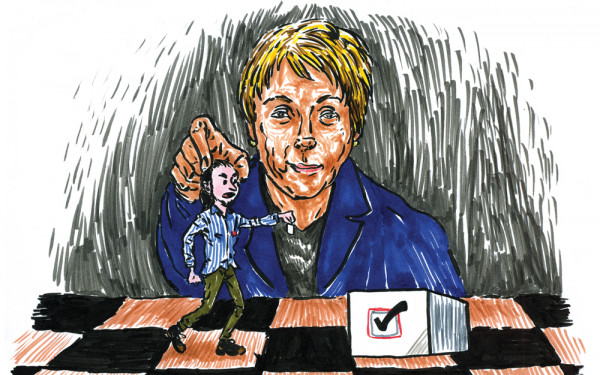Charter of Quebec Values: What Does it Mean to Concordia?
CUPFA Comes Out Against Charter, University Still Staying Mum
The Concordia University Part-time Faculty Association announced Friday, Sept. 20 the union cannot support the Charter of Quebec Values.
Concordia won’t reveal its official position on the proposed charter until the National Assembly makes its final decision.
Still, if it’s approved, many at Concordia fear the ban on conspicuous religious symbols for public workers—which includes university employees—would affect the quality of learning, limit students’ career opportunities and create tension inside the university.
A Secular School?
Under the proposed charter, teachers and staff members would be forbidden from wearing a hijab, turban, kippa, large crosses or any other “ostentatious” religious symbols. The rule would not apply for students, however.
Both government employees and users of government services also wouldn’t be allowed to cover their faces in public institutions—in other words, both professors and students would be prohibited from wearing religious face-covering headscarves, such as the niqab and burqa, inside the university.
If Concordia chooses to oppose the policy, it can apply for a five-year renewable exemption, in which case employees would be able to wear religious symbols while working.
Threatening the Quality of Education
Philippe Bastien is a Concordia finance student who believes having professors from other cultures or countries is essential.
“One of the things that sets Concordia apart is our multiculturalism, and it adds to the richness of our learning experience,” Bastien said.
According to political science professor Francesca Scala, the ban on religious symbols would make recruitment of professors and researchers from within Canada and abroad extremely problematic.
“It would be an obstacle to hire the best and the brightest,” she said. “How are we going to sell it? Saying ‘We think you’re excellent, that your research is wonderful, but by the way, you can’t wear a veil, or a turban?’”
“I think the problem would come in if you go to class and you’re trying to impose your religious beliefs,” she said. “In that sense neutrality is very important.”
Still, Scala says she believes showing religious affiliation doesn’t affect a professor’s capacity to teach, nor is it an attempt to impose certain religious views.
“Just because a teacher wears a turban doesn’t mean he is biased,” said Cristine Flynn, another Concordia student.
Bastien, however, said that some religious symbols, such as the burka, could affect a professor’s capacity to teach.
“Having the face covered might not be the best to communicate with your students,” he said. “But it would be for a practical reason, not for a religious reason, that students would be affected.”
Choose a Career, Just Not in Public Service
Many Concordia programs, like education, public affairs, political science or economics, can lead to careers in public institutions, where the ban on religious signs would be implemented.
But unlike Concordia, for many of these institutions, the possibility of applying for an exemption would not be possible.
“You are not allowed to be equally committed to your religious beliefs and to your career,” said Scala. “So you can be a student, work in the private sector, pay taxes, but you cannot be in a position of power or authority.”
Creating Tensions Between Students
Aaishah Karim is one of the executives of the Muslim Student Association, and says she wears the hijab by choice, not because she is forced to.
A few days ago, Karim says she was leaving the Hall Building with a group of friends, who were also wearing hijabs, when a group of students started mocking them.
“They kept laughing and saying as-salaam-alaikum! As-salaam-alaikum!” she said, referring to the Arabic greeting meaning “peace be unto you.”
According to Karim, the proposed Charter of Quebec Values will only exacerbate those tensions by creating division within Quebec society.
She also says the ban points out differences instead of unifying the cultures of Quebec, and as a result creates fear of “the other.”
“We could blame ignorance, but Concordia students are educated people, exposed to different religions and ethnic backgrounds,” she said. For her to experience racism at the hands of other Concordia students “shows the kind of ‘unity’ the Quebec charter is bringing,” she continued.
What’s Next?
“We’re told to act in a positive manner,” said Karim. For MSA members, this means developing a dialogue with other students to explain why religious symbols are important to Muslims.
“It can help with the notion that we are not the ‘others,’ that we are not different,” she said.
A petition, asking for the withdrawal of the ban on the basis that “agencies of the state and public institutions such as universities should embody tolerance toward all members of our diverse society,” is currently being circulated among Concordia professors.
Paul Allen, associate professor of theological studies, started the petition.
It will be submitted to Quebec’s Secrétariat aux institutions démocratiques et à la participation citoyenne, the province’s assistant to the Minister responsible for Democratic Institutions and Active Citizenship, on or after Oct. 15. As of press time, the petition has 67 signatures.
But with the future of the charter yet to be determined at the National Assembly, Concordia is still in a state of uncertainty.
Should it pass, the university will ultimately have two options: apply for an exemption or require employees to adhere to the charter’s rules.

1_900_599_90.jpg)
_900_599_90.jpg)
_600_832_s.png)



_2_600_375_90_s_c1.jpg)
WEB_600_375_90_s_c1.jpg)